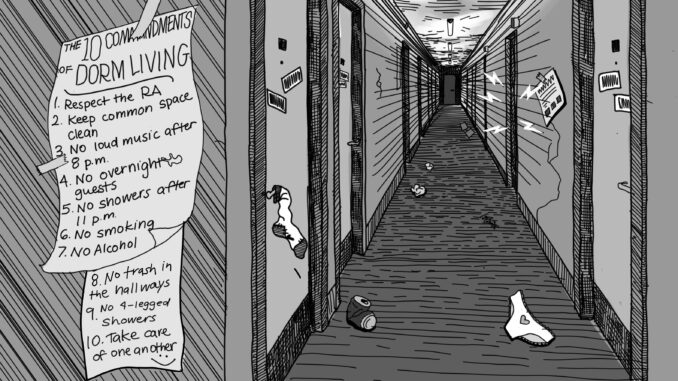
The costs and benefits of living away from home are a contentious topic predominantly among first-year college students.
Having just entered the world of adulthood, our newfound independence frequently leads us to make some reckless decisions early in our college careers that may not serve us well in the long run. There are a lot of unspoken rules to being successful while living away from home, especially in dorms where many of us share a living space with someone we do not know very well. Everyone’s homelife is different, which means there is a diverse set of skills coming together to form friendships and partnerships.
When considering dorm living, our first thoughts should go to the Resident Advisors (RAs) and their role in helping students transition to a more independent style of living. RA’s act as a buffer between a moderated living situation and a fully self-reliant way of living. RAs give structure to life in dorm halls by organizing fun events, maintaining order and ensuring the safety of other residents. Though they are an invaluable part of the college experience, RAs do not take on the role of an overbearing parental figure, making them the perfect people to help with the transition into independence.
There are many elements to becoming self-sufficient individuals who are accomplished, productive members of society. Arguably, the most important skill needed to be truly independent is emotional intelligence. Being able to perceive, understand and manage emotions goes a long way in college life, and eventually in the working world.
Dorm living is a microcosm of society that helps students develop emotional maturity. Interacting with difficult roommates, learning how to compromise and approaching confrontation with an open mind are some of the skills that we develop through the dorm experience.
As someone who has had my fair share of roommates, I have seen an immense growth in empathy and understanding from both roommates and myself throughout my years of boarding school. Being in tune with yourself and others also helps with networking, which is always a good skill to have in your toolkit.
Financial management is another practical skill key to success in the world. Many students choose to work part-time jobs to help offset the costs of textbooks, food and “goodies.” At the same time, living in dorms mitigates a lot of the financial responsibility required to live on one’s own. Not having to pay rent every month takes a chunk of obligation off our shoulders. Other financial responsibilities absent or reduced in college include gas for commuting as well as groceries since students can primarily rely on meal plans provided by the college.
Other important elements of independence include organization, time management, personal hygiene and medication management (for all the mentally ill baddies). Separately, these things seem insignificant, but altogether, they are the essential factors that dictate how we establish ourselves as members of society. Living in dorms helps students learn to balance all these factors while they still have direct access to a structured support system.
There is no right or wrong way to become an independent member of society. Even though dorm living has its drawbacks, such as noisy neighbors and messy communal kitchens, it is undeniable that it can be a valuable transitional step into the world of adulthood. But no matter where we choose to live, it is for us to decide how we want to walk through the world and how to acquire the skills we believe are essential to becoming someone we are proud to be.
Subscribe to the Mossy Log Newsletter
Stay up to date with the goings-on at Lewis & Clark! Get the top stories or your favorite section delivered to your inbox whenever we release a new issue.

Leave a Reply